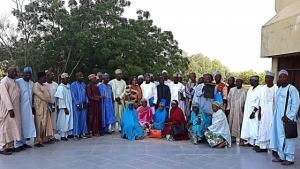WHO supports National Health Workforce Registry in Nigeria to be ready by mid-2015
Abuja, Nigeria 5 February 2015 - In efforts to kick start the process of a state level health workforce registry in Nigeria, the World Health Organization (WHO) has supported Bauchi and Cross River States to hold two workshops to pre-test the National Health Workforce Registry (NHWR). A fully functional NHWR is expected to be ready by the middle of 2015.
The two workshops were chaired by representatives from the Commissioners of Health and attended by various stakeholders from relevant ministries, departments, agencies, health regulatory bodies, development partners, professional associations, and the private sector in the two States.
WHO Representative Dr Rui Gama Vaz was represented at the meetings by Dr Eileen Petit-Mshana, the leader of Health Systems Strengthening and said “it [NHWR] is an essential component for strengthening national health systems at all levels”, and posited that health workforce data is crucial for HRH planning, budgeting, research development and advocacy, and charged all stakeholders to maintain the momentum towards realizing the goals of the Registry.
Dr Petit-Mshana also stated that the NHWR project is being supported with funds from the Canadian Government’s DFATD Human Resource for Health Project and reiterated the commitment of the Organization in ensuring qualitative NHWR implementation in Nigeria.
The meetings included presentations and the milestones made by the National Operational Guidelines of Nigeria’s NHWR and AfriHUB, an indigenous IT firm conducted practical demonstrations of the prototype software that has been developed for the Nigerian government.
Participants at both meetings expressed delight at the progress reached on the NHWR. The comments of stakeholders ranged from calling on organizers to conduct further trainings for health managers, manage staff movements, use the software to address “ghost worker syndromes”, address issues of retention and mal-distributions, urban-rural misbalances, gender inequities, aid effective retirement plans, address issues of workload in health facilities, and link staff production and staff forecasting models.
WHO will continue to support Bauchi and Cross River States to establish functional health workforce registries, support the provision of software including processes to the States for the establishment of the NHWR, organize further trainings for health managers and users, and ensure improved protection of the Registry against cybercrime.




